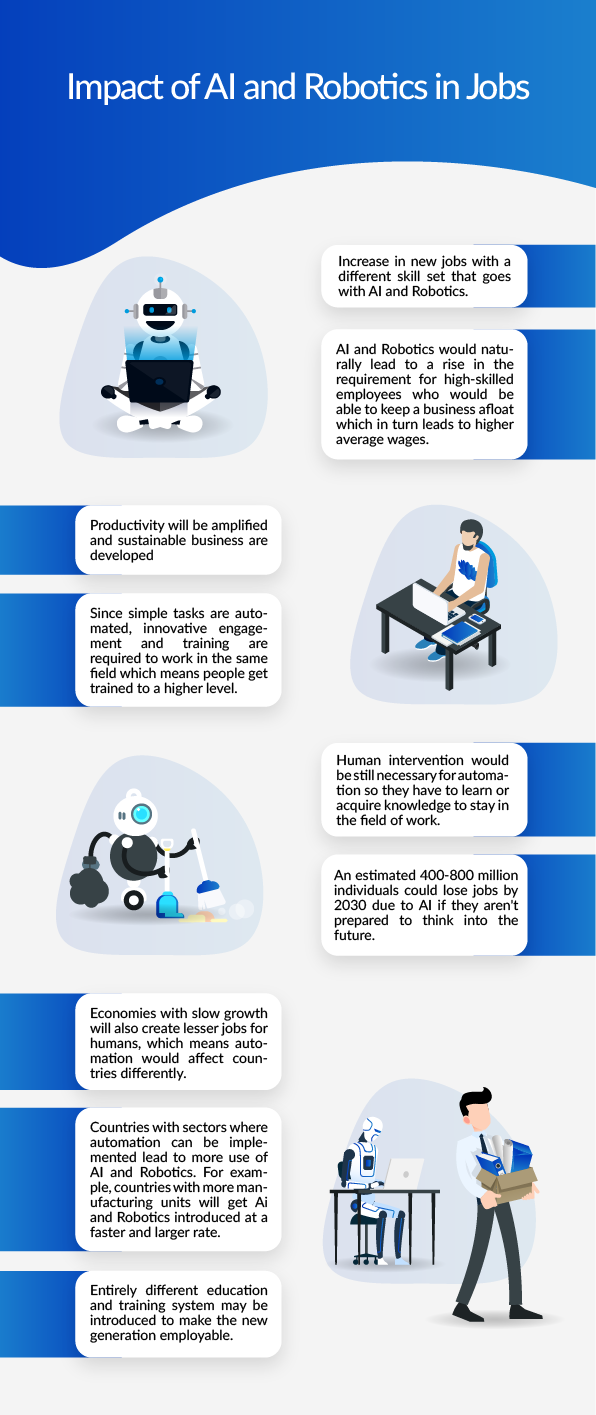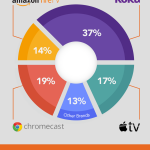How Artificial Intelligence (AI) and Robotics impact jobs in the future
The phrase “Artificial Intelligence” strikes terror in the hearts of a multitude of people whenever it is uttered in a social gathering. It evokes images of advanced robots marching in military style and super intelligent organisms tracking humans’ every move, as scattered in the modern sci-fi movies.
Are you finding your heart and mind to be panic-stricken due to the inability to separate the realistic future of AI and Robotics from its fictional representation? Go through this article to find out the probable ways in which AI and Robotics would impact one of the most crucial areas of your life, namely, your employment. We guarantee that you will sleep a little more peacefully by the end of this.
First things first—a reality. If we said that robotics and artificial intelligence have not started to make their impact on all walks of life, thereby impacting humans’ productivity in general, we would only be lying. Those old methods through which not only professional capabilities were judged, and compensation were determined, but also how work was completed have undergone a massive change since the advent of artificial intelligence.
I know those mentioned above might seem like a general fact without any real weight. However, once you take a look at how people in high managerial roles have been stressing on the need for new employees to exhibit the capacity to evolve and acquire new skills and how repetitive jobs are increasingly being accomplished in a computerized form, you will realize that change is coming, even though it is happening slowly but surely.
In such circumstances, you should know the following ways in which artificial intelligence is impacting human labor so that you can try to assimilate these qualities as much as and in whichever possible ways in your workplace practices:
Productivity will be amplified like never before
If you are a part of a small-sized business, you should pay extra attention to this point. Though the limited budgets have kept small business at a disadvantage, the affordable AI tools have opened new doors for optimization and advanced targeting. The companies that conduct their business in not only developing but also developed countries use robotics-based technology to amplify their product delivery time and development. Instead of depending on cheap labor, artificial intelligence allows these countries to use more affordable technology to gain a competitive edge in the market.
Greater need for channeling the creative spirit
Start getting geared up, as the next massive change after the Industrial Revolution is coming for you. India, China, Latin America, and Africa, which once found themselves at the top of the productivity pyramid, have already started to feel the repercussions that occur when jobs that are repetitive comprise the significant functioning of industries. In such a dynamic environment, there is an increasing need for creating jobs that require the employed people to think on their feet to come up with innovative solutions to problems.
The Silver Lining
Don’t get stressed just yet. There’s a silver lining to the sea change that businesses are undergoing with artificial intelligence and robotics. Increase in productivity would naturally lead to a rise in the requirement for high-skilled employees who would be able to keep a business afloat in these murky waters in the post-globalization world. This, in turn, would automatically lead to an increase in the average wage scale, thereby leading to an improvement in the general quality of life of the common public.
A Boon in Disguise? The following are the Monumental Aspects of Artificial Intelligence in which all of us should focus on building an inclusive future:
Once upon a time …
The terms “artificial intelligence” and “robotics” might seem to be revolutionary nowadays; however, the process of automation had started a long time ago. Just think deeply about the history of cars and looms whose functioning is automated, and the realization that they were nothing but the precursors of artificial intelligence will dawn on you.
It’s time that counts
Nowadays, companies increasingly prefer artificial intelligence. Although the wish to reduce human labor is one of the critical factors, heads of companies have come to realize that employing machines to undertake repetitive actions and take monotonous decisions whose results aren’t going to change in the near future, such as performing computational functions or something as simple as baking a cake, can present humans with the gift of time. In the free time that would henceforth be available, humans would be equipped with the power to fully apply their hearts and minds to work on further innovations to make their engagement in their respective workplaces to be qualified as productive labor.
The future: An integration between humans and robots
No matter what anyone of any importance says, jobs and human employment will never be completely replaced by artificial intelligence and robotics. According to statistical data, approximately 10% of all tasks can be completely automated. Even though human labor engagement can be augmented and complemented by robotics, to ensure that the quality of the produced work is maintained, humans have to be involved in the manufacturing or production process in some way or the other. Just ensure that you work on increasing your skill set and the quality of your work, and there’s no way in which your contribution would be swept aside when the Man Vs. Machine debate becomes more pertinent.
Which industries’ functioning will be affected the most due to the incorporation of artificial intelligence?
The automotive, banking and manufacturing industries are most likely to be disrupted due to artificial intelligence. This is because the new advancements in technology will radically change those ways in which these industries conduct their business.
Take the medicine-manufacturing industry, for instance. Drug modeling and formulation, gene mapping and clinical trials that are simulated would all undergo a drastic change once the use of artificial intelligence is normalized.
Also, the mode in which teaching is dispensed will also be revolutionized, as smart boards and automated ways of instruction will become the norm rather than the exception. Moreover, there is going to be an immense surge in the number of available jobs in the domains of nature conservation, natural sciences, and agriculture.
Last but not least, to be prepared for what the future might bring, it is essential to understand the potential of robotics and artificial intelligence. Consequently, a framework comprising rules related to the functioning of systems that are automated must be devised. The common people should be made aware of the impending technological change and encouraged to engage in discussions related to security, liability, privacy, and safety in the era that would follow the advent of artificial intelligence. This would lead to the mitigation of possible concerns and facilitate a smoother transition.
Finally, designing and implementing the policies which will assist us in making the most out of the possibilities related to technology is of utmost importance. For instance, the concerned parties might consider redesigning the training programs in the education domain to employ workers with the appropriate qualifications who would be able to work in conjunction with the new technology. In case there is a replacement of human labor by machines in some industries, governments should facilitate job reallocation and assistance services.
Author Bio

Neeraj works as a Growth Assistant at AirTract.Com, a social platform wherein people ask any questions, write and learn from articles, share and sell their knowledge and experience. Graduated as a Computer Science Engineer, he is now a digital marketing enthusiast who reads and finds the latest techniques to grow an organization. If he is not working, either he would be on a football pitch or listening to music.
















